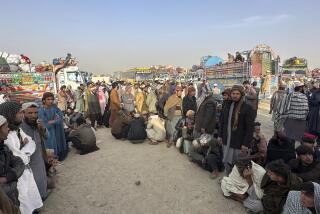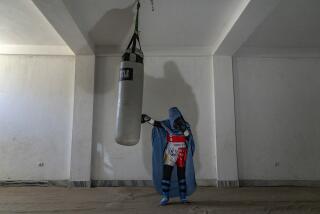Taliban Corralling Men, Afghanistan Refugees Say
DENOU, Afghanistan — It was 4 o’clock on Sunday morning when Taliban soldiers pulled up at Wahidullo’s apartment block in northern Kabul with 50 Datsun pickup trucks and started rounding up young Tajik men.
Armed with Kalashnikov rifles, the soldiers seized 13 men, ages 18 to 30, one of whom they bound and gagged, and press-ganged them to defend the country in case of an American attack, Wahidullo said.
“That was when I decided to leave. I was afraid they’d take me too,” said the 30-year-old father of two young children.
For ethnic Tajiks headed north on the old Kabul road Monday, the journey began in a predawn panic Sunday, as soldiers descended upon their neighborhoods, stopping to loot televisions, VCRs and other valuables.
The refugees piled into cars and headed north until they reached the front-line no man’s land that their drivers would not cross. Carrying their children, they walked three hours in the scorching sun before reaching territory controlled by the opposition Northern Alliance.
The refugees braved Taliban bomb attacks and faced trigger-happy bandits who stole what little cash they had left after paying the extortionate drivers.
As Afghanistan prepares for war, the exodus from its cities has begun, after millions have already been displaced by successive wars over 22 years. Members of the Taliban are among those frantically moving their families out of Kabul, said refugee Mohammed Hossam, 30.
Refugees like Wahidullo, who goes by one name, fear that American bombs will land on the capital, but the trigger for their escape was the Taliban press gang. On Monday, the Afghan government said it was mobilizing 300,000 troops to help fight off any U.S. attacks. Some observers considered the figure grossly inflated.
Wahidullo, who lived on the fifth floor of his building, saw soldiers taking away combat-age men on the second floor. That’s when he knew he had to spirit his family away.
“They take the young men and take them to the front line to fight with the American people who are coming,” said 58-year-old refugee Mohammed Anwar, speaking in English. “Those who refuse are sent [to jail.]”
Refugees were consistent in their descriptions of the roundups, which they said began three or four days ago. Ethnic Tajik men were being sent to the most dangerous military posts, they said.
There was no independent confirmation of their stories; Western journalists have been kicked out of Kabul.
With the combined threats of Taliban raids and American bombs, about 100 refugees a day are making it out along the harrowing northern road--most of them frightened ethnic Tajiks.
Afghanistan’s ethnic rivalries go back centuries and highlight the difficulties of finding a stable political solution here. In the northeastern opposition-held Badakhshan province, most of the people are ethnic Tajiks. They face persecution from the Taliban, who are ethnic Pushtun. Afghanistan, with 25 million people, is 38% Pushtun, 25% Tajik, 19% Hazara and 6% Uzbek; other smaller groups make up the rest.
About 300 members of the Hazara minority have been taken by the Taliban press gangs in recent days, Hossam said.
Fighting has blocked the main road from Kabul to the north, built during Soviet occupation, so refugees are taking the old Kabul road.
Eleven-year-old Dina, her face quiet and solemn, described her fear as her family fled the capital.
“We left everything behind. Everyone says the Americans are going to bomb. It’s getting worse in Kabul. The Taliban were taking people. I was afraid,” she said.
Her father, Abdul Khamid, 45, a businessman who trades in sheepskins, has lived in Kabul 20 years. He said his family of nine, crammed on the back of a jeep with 11 others, was exhausted, dirty and hungry after the ordeal.
He described scenes of chaos and panic in Kabul as people abandoned the city.
“Everyone was afraid. People were leaving in cars or pushing handcarts. Many young people were seized during the night and taken away to fight,” he said.
From the opposition-held north, the sounds of shelling were audible in the mountains. Nabi, a Red Cross administrator, confirmed that fighting was taking place near Bagram, a key opposition post.
In the still noon heat Monday, Taliban bombs crashed around the village of Doornama, the crossing point for refugees coming from Kabul, sending echoes across the valley. There was no way of establishing casualty figures.
On the edge of Denou village, about 35 miles northeast of Kabul, nomadic families sheltered with their sheep and goats in low, black cloth tents. A pair of hobbled camels waited nearby.
Denou residents warned that it was unsafe to drive farther along the road to meet refugees arriving on foot.
“Don’t go today,” they warned. “If you go it will be very dangerous. There are bandits. They will kill you. It’s very easy for them to kill you.”
In a neighborhood where volatile teenage boys slouch around with Kalashnikov assault rifles slung on their shoulders, the advice underscored the unpredictable and tense atmosphere in these hills--and the kind of dangers any invading American ground forces might confront.
Three warlord gangs control a section of the road near Doornama, held by the Northern Alliance, which has been fighting the Taliban since the mid-1990s.
Ancient jeeps painted in gaudy colors buck along the corrugated mud track, many with six or eight men piled on the roof and refugees inside: old men, women shrouded in chadors, youngsters and babies. Most carried few belongings; there was room for little other than people.
Traders on horses and donkeys smuggle oil from Kabul across the front line to Doornama, where other traders like Nabi, 38, move the oil north in vans and trucks. The refugees are ferried along with the oil like so much cargo.
Nabi described how bandits on the road spring out from behind rocks with their guns raised and steal money, watches and other valuables from the passengers. “If your shoes are good, they’ll take them,” Nabi said.
The brigands appear loosely aligned, some closer to the Taliban, others to the opposition.
The refugees on the old Kabul road were heading for camps in Gulbakhar, a bustling village of narrow streets, teahouses and bright market stalls selling grapes, apples, tomatoes and piles of red chilies. The camps, however, are squalid, without running water or power.
For Dina, the refugee girl, fear of American airstrikes is tempered by hope that they could pave her family’s way back to the capital.
“Kabul is a good city,” she whispered before the jeep lurched off toward her new home in the refugee camp.
*
Special correspondent Sergei L. Loiko contributed to this report.
More to Read
Sign up for Essential California
The most important California stories and recommendations in your inbox every morning.
You may occasionally receive promotional content from the Los Angeles Times.










